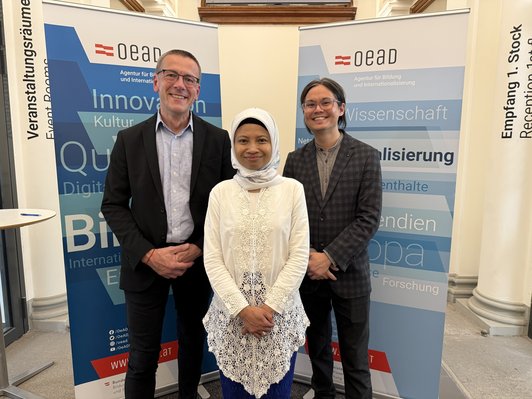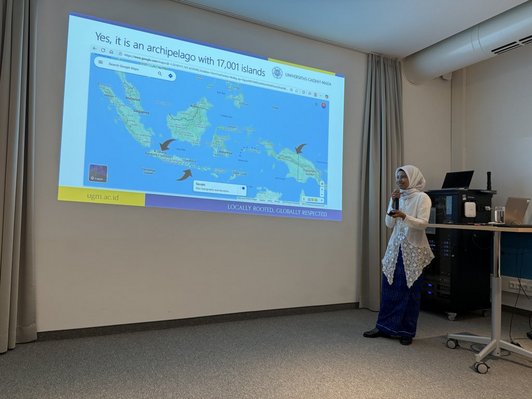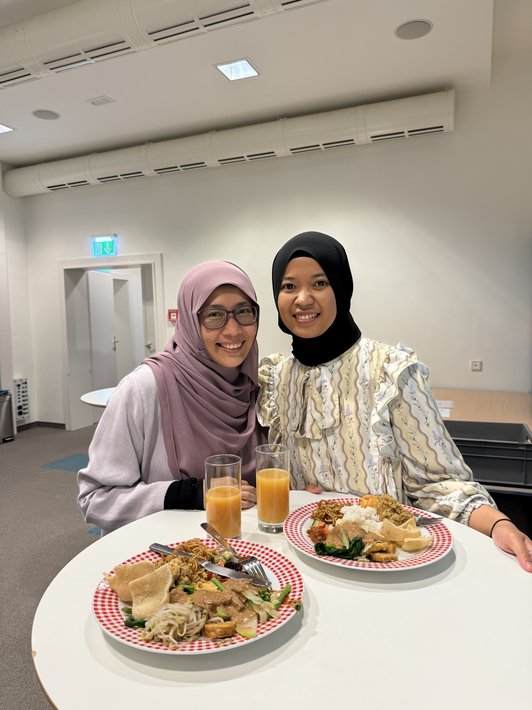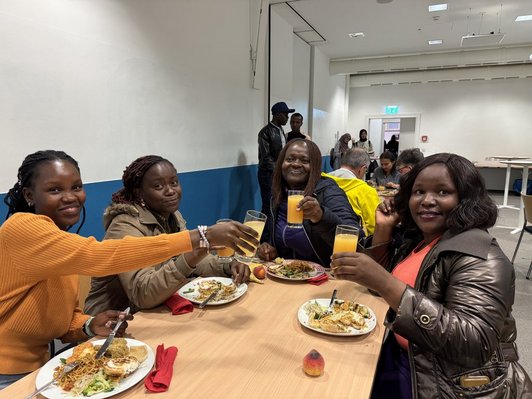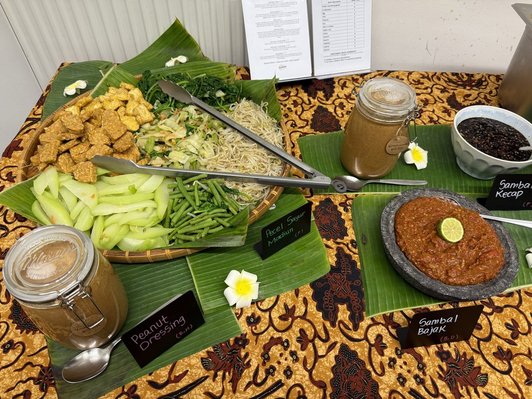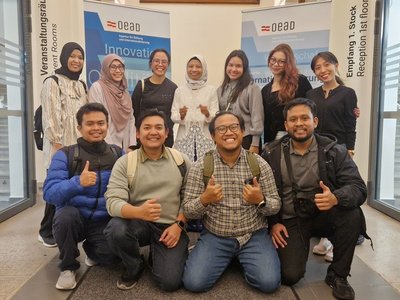

The event held on 22 May 2025 at the OeAD in Vienna gave participants the opportunity to hear from Retno, who is an Associate Professor in Dental Biomedical Sciences at Universitas Gadjah Mada (UGM) and a practicing dentist at Prof. Soedomo UGM Dental Hospital. Her global collaborations span Japan, Germany, Austria, Australia, and the United States, working with researchers, clinicians, government bodies, and industry professionals. To find out more about her research areas, expertise, and publications, please see Retno’s detailed Curriculum Vitae.
On behalf of the OeAD, Gerhard Volz, Head of International Cooperation in Higher Education, welcomed the guests. He explained that the aim of the OeAD Alumni Talks is to invite former scholarship holders to share their professional experiences before and after their stay in Austria with a wider audience. The implementation of Scholarships is at the core of OeAD activities. Scholars serve as ambassadors of their home countries, and after studying in Austria, they also become ambassadors of Austria in the world. As Retno’s story illustrates, they can play a vital role in fostering future cooperation. Participants were also invited to have a look at the OeAD.map, which displays registered OeAD-funded projects and allows OeAD scholars to present themselves in an international context. He encouraged the participants to learn more about Indonesia by sharing intriguing facts, such as the country consisting of more than 17,000 islands and its ambitious plan to build an entirely new capital city on the island of Borneo.
In 2023, Retno received the Ernst Mach Grant postdoctoral scholarship within the ASEAN-European Academic University Network (ASEA-UNINET) collaborating with Prof. Erik Reimhult at the BOKU University on antimicrobial regenerative membranes, with ongoing research. The ASEAN is a network of European and South-East Asian universities with the goal of promoting the continuous internationalisation of education and research. Every year more than 80 bilateral and multilateral research projects are conducted. These include PhD and Postdoc scholarships that are granted to students and researchers. Please read more about ASEA-UNINET and the funding opportunities in the presentation here, delivered by Christoph Wayu Niederhauser (OeAD, Team Lead for Cooperation, Mobility Programmes and Cooperation) during the event.
Retno began with an overview of key facts about Indonesia. It is located approximately 10,778 km from Austria and lies on the equator, giving it a tropical climate. Indonesia is exceptionally rich in biodiversity and is home to around 270.2 million people. Approximately 80% of the population is Muslim, making it the largest Muslim-majority country in the world. The country is also remarkably diverse culturally, with more than 1,300 ethnic groups and over 2,500 languages recorded in 2010—of which 694 are actively used today.
In the second part Retno shared three crucial intersections in her life, moments where she had to make difficult decisions that ultimately shaped her future.
The first intersection came early on, when she was confronted with strong societal and cultural expectations that placed domestic duties as a woman’s primary role. She had to navigate the tension between pursuing a career and fulfilling traditional family obligations. Especially as the level of education and professional role increases—from housewife to full-time worker and even top manager—the social pressure intensified. Despite these challenges, she chose to pursue a university education.
The second turning point was learning to adapt to the demands of her community. She received training to enable her to work in any conditions, developing resilience and versatility in the face of external expectations. Her experiences within the community have made her aware of the uneven distribution of dentists in Indonesia, which creates unequal access to dental care. At that time, she had to choose between becoming a practising dentist in a remote area and pursuing an academic career. She chose the latter, despite the many challenges that came with it. Along the way, she came to understand that making a contribution and having an impact are not always the same.
After learning about the academic atmosphere in Indonesia, where sustaining research after a PhD is challenging, especially for those who have studied abroad, she arrived at the third intersection. The technology gap, as well as diverse national priorities, politics and regulations, mean that countries have different perspectives on how to perceive and steer their development. A lack of sensitivity to these challenges may impair the ability to continue focusing on the same topic after graduation. Conversely, studying abroad nourishes the scientific journey through advanced technology, a well-developed research environment, and diverse work ethics. It was at this point that she decided to do her PhD in Indonesia under the supervision of a globally renowned professor from Japan and Indonesia. Bringing local context into global collaboration is one way she realised could work for future research continuation. She learnt various techniques in translational research and maintained collaborations while conducting most of her PhD research in Indonesia.
Her journey highlighted that some things remain persistent, especially the importance of emotional support. She had a mother who encouraged education and a father who empowered her. Together, they believed that education is their best inheritance. She also spoke of a teacher who deeply believed in her potential and supported her academic journey.
Retno concluded her presentation with some highlights of her career. She emphasized that empowerment often begins at home, within the heart of the nuclear family. It grows through the bonds between parents and children, shaped by the values they share and the support they offer each other. Agility — whether mental, emotional, or professional — doesn’t come overnight. It is gained through persistent training.
We learned, too, that listening is more than just hearing; it’s an intentional act that allows us to understand others more deeply. And perhaps one of the most comforting truths is that no knowledge or skill ever goes to waste. Even if their purpose isn’t immediately clear, their value often reveals itself later, in ways we never expected.
The presentation was followed by a lively Q&A session, facilitated by Elke Stinnig, APPEAR Programme officer, at the OeAD.
Retno emphasized that studying abroad offers valuable opportunities for academic and professional growth. At least one collaboration network is ready to grow, specifically with the supervisor. There is also a high chance of interacting with colleagues from other countries who are studying at the same institution. This provides an additional opportunity to expand your professional network. Participation in social events, such as the OEAD Alumni Talk, proved to be a meaningful way to expand one’s professional circle, even if long-term research collaborations don't always materialize. At the very least, lasting friendships are formed.
Another question was about what she did after her PhD to initiate a collaboration. Retno participated in international conferences, courses, and scientific societies. Additionally, she reached out to experts they hoped to collaborate with. While not every attempt led to a successful partnership, the researcher found that the most fruitful collaborations emerged from networks grounded in mutual respect, good intentions, and genuine friendship.
Participants were also interested in the benefits that Retno gained from her research experience in Austria. Retno explained, that during her time in Austria as a visiting researcher, she gained valuable insights into a different academic and working culture compared to Indonesia and Japan. She was impressed by the ability to balance work with personal life.
Furthermore, she observed how well-managed, integrated infrastructures in Austria efficiently support academic research. Their technical skills also improved significantly, as researchers in Austria are often granted the independence to operate equipment themselves—an opportunity that deepened their understanding of the technologies involved.
The audience deeply appreciated the diverse perspectives shared throughout the talk. Not only did they gain a deeper understanding of Indonesia, but they also took away meaningful insights into the speaker’s personal path to becoming a university professor, realities of balancing roles as both an academic and a clinician and building international collaborations. The participants also found it especially powerful to hear about how the speaker has navigated the challenges of being a woman pursuing an academic career while facing societal expectations in a traditional society. Please see Retno’s presentation here.
The Community Empowerment-based Student Community Service Programme at Universitas Gadjah Mada helps students develop independence, leadership, and entrepreneurial skills. Deployed across Indonesia—including rural and remote areas—they engage with diverse communities, enhancing their empathy and adaptability. Working in multidisciplinary teams, they also interact with public leaders, local governments, alumni, and philanthropists. These two videos—one filmed in Sarmi (https://www.youtube.com/watch?v=3XhodADaA1k) and the other in Biak Numfor Regency (https://www.youtube.com/watch?v=exHoJh_lKLc)—were shown before the event to highlight the activities of the Community Empowerment-based Student Community Service Programme in Papua Province, Retno’s birthplace.
The talk concluded with socialising over delicious Indonesian food and drinks, providing a wonderful opportunity for networking and cultural exchange.

